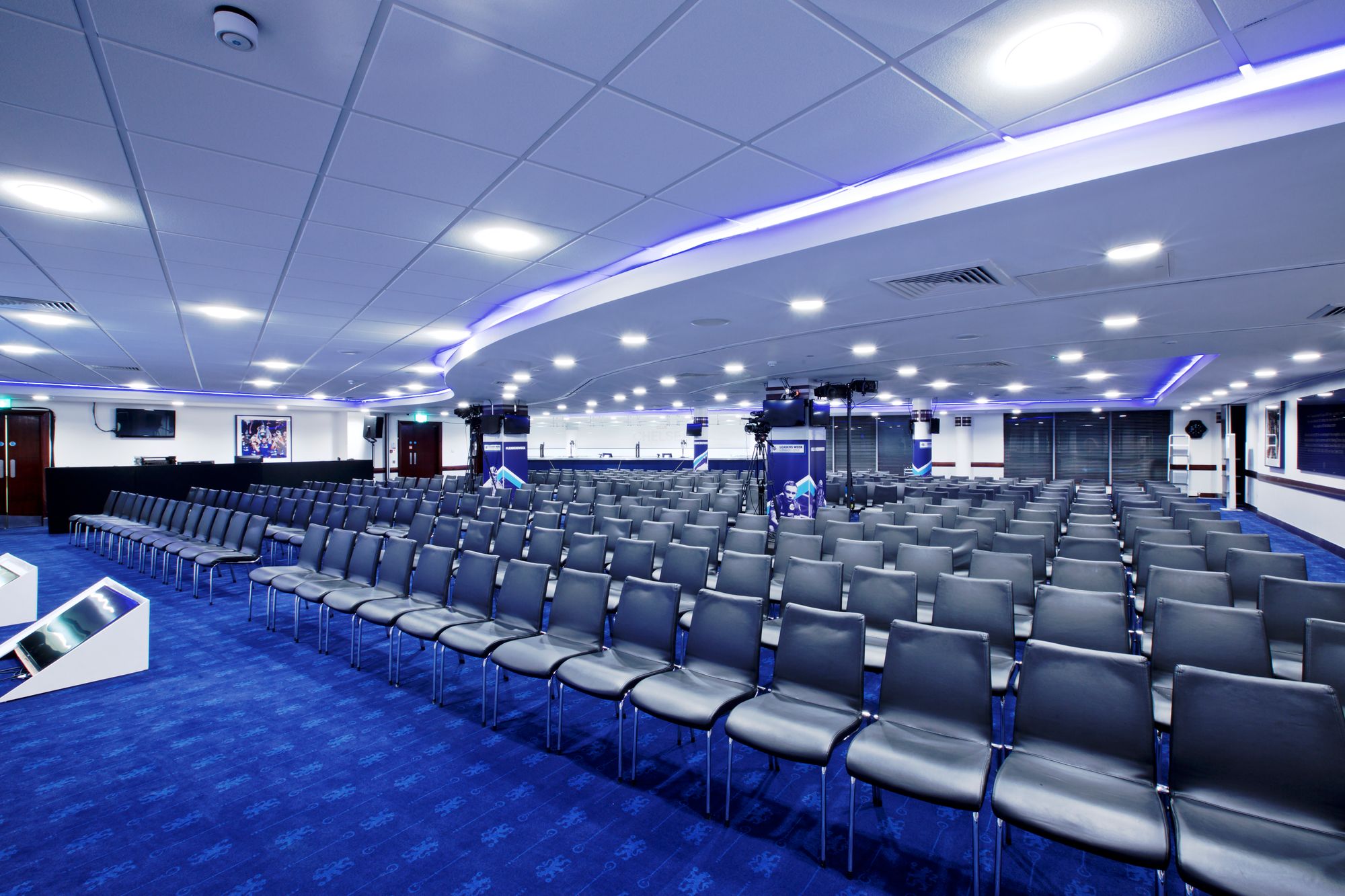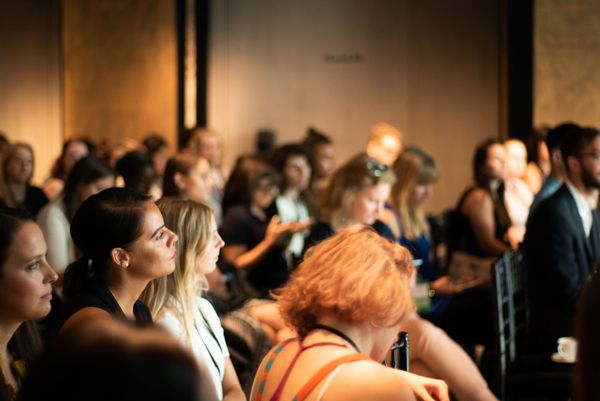On Tuesday 17th August 2021, the Hire Space Virtual Team delivered the fourth instalment of Adapt with Arena, 'Delivering The New Attendee Experience For In-Person Events'. This event was held in partnership with Events At Club Chelsea, which you can find out more about below.
The first panel discussion of the morning focused on how eventprofs can go about strategising for the new in-person event experience. We were joined by Lucy Adamson, Meetings & Events Manager at our partner Events at Club Chelsea, Mark Mulligan, Director of Operations at IMEX Group, Clare Melton, Global Head of Events at IHS Markit, and Cameron Roberts, Digital and Community Editor at Conference News, who moderated the session.
Watch the full video and read the key takeaways below.
Table of Contents
1. Watch The Panel Discussion
2. Key Takeaways
3. Q&A
4. About Events At Club Chelsea
5. About The Speakers
6. About Arena
Watch The Panel Discussion
Key Takeaways
Cautious confidence
There's no denying that people are keen to get back to attending events in-person and that the desire to reconnect is there after so long apart. However, this confidence is somewhat theoretical, as we notice planners are being more careful about when they're booking events and attendees are making decisions about how they will attend events much closer to the event date. So, it's fair to say this confidence is twinned with a bit of reticence, although we hope to see a continuing uptick of confidence as time goes on.
For larger, ticketed events such as IMEX, whilst there is again this cautious approach, the increasing level of confidence is indicated by the large number of buyer signups, as well as the increased budgets and positive conversations IMEX have seen coming from the exhibitor/supplier side.
Why are attendees concerned?
One of the main concerns attendees have is travelling for an event. Most of us haven't travelled since before the pandemic, so there is a degree of concern around personal risk. As such, planners will need to help attendees to work through this lost confidence and encourage them to get back on the bike as it were, by thoroughly communicating what measures are put in place, working hard to understand risk levels, and instilling as much confidence in attendees and clients as possible.
Aside from risk, there is also the question of travel budgets - companies are now more selective about events their employees attend and only choose those which will give them the most return, provide them with the most networking opportunities and the best content etc, so this is another reason for planners to step up their game and create better events than ever before.
Deciding which measures to implement can be a minefield
It's about working out where confidence levels sit, and tailoring the approach accordingly, working from a matrix of measures ranging from more stringent to more relaxed. For example, attendees will still expect to see things like hand sanitiser, masks and social distancing, even though these measures are not necessarily mandatory any longer in the UK.
It's also important to ensure you actually follow through with any promised measures, to avoid attendees feeling uncomfortable at an event they thought they'd feel safe at. As planners, we should allow our attendees to feel like they're making a personal choice, without feeling like they're in the minority.
For larger events such as IMEX, it's important to try and implement any measures that can remove unnecessary crowding or waiting which could increase anxiety among attendees. Such measures include larger areas, one-way systems, pre-printing of badges at home, multiple entrances, wider aisles etc.
Dealing with push-back
Most clients and customers will be understanding and cooperative, but some planners have experienced push-back on some measures. As a workaround to this, our panellists advise planners to look at other events that have taken place, ask your chosen venue about their experiences with other events, take note of best practice, and gain feedback from stakeholders, attendees and/or clients to gauge sentiments. It's impossible to please everybody, but try to build a picture of what people find acceptable to enforce and make a judgement call.
Dealing with flouters
Dealing with attendees who may be flouting measures or deliberately trying to jeopardise the event can be a tricky situation to contend with. Ultimately, it again comes down to communication and having an escalation plan in place to tackle the situation head-on and take any necessary actions to talk with the attendee or in extreme cases, remove the attendee from the event completely.
Post-event communication - what's the protocol?
Sending follow-up emails about the event is always a good idea, but even more important now. Enhance your standard post-event survey and ask your attendees and clients how they found the event, whether they felt safe, what could you as the planner do better next time etc. Making your survey more granular in regards to the safety aspects will help you to understand audience sentiment and continually improve on your event delivery going forward.
In 5 years time...
We will likely get to a point where sustainability severely impacts how we run meetings and events. Hybrid is a great alternative to help limit resources and the need to travel, however at the same time we will truly value the experience of meeting face-to-face and the experience of human connection, so solely live events won't disappear completely anytime soon. We will adapt as an industry, and continue to grow and flourish.
Q&A
Do you feel like there has been a rise in the number of no-show attendees after Covid, and is there an easy fix?
It's tricky to assess and measure this, but there certainly is likely to have been a rise in no-shows. All we can do as planners is try and communicate as clearly and positively as possible about measures we're putting in place to try and mitigate against some of that drop-off we may see in attendance.
What's the minimum level of safety regulation we should be implementing at events?
That depends very much on your audience, for example, if your audience is double-vaccinated. There isn't necessarily a minimum level per se, but it's simply crucial to stand behind anything you promise with regards to safety measures. A good approach to adopt is also aiming to make the least confident person at your event feel safe.
What is the best way to communicate restrictions/measures with guests?
You can't over-communicate! From the outset, clearly communicate absolutely everything you're doing to keep attendees safe, but also state that you retain the right to make changes as needed and include it in your terms and conditions too. Put it everywhere you can and be really open to make it crystal clear, as well as asking your past delegates about their sentiments too.
It's also a good idea to put together a one or two pager information sheet to again communicate every little thing and make it accessible to every single person at your event.
There is confusion in North America around people who are double vaccinated with Astra Zeneca not being allowed to attend events. Is this true?
There is a lot of rumour about this, but ultimately event organisers will have to make their own call regarding which vaccines they find acceptable or not. There are some resources, such as the Centre of Disease Control in the US which is the best place to access the very latest information.
Do you think there will be a backlash from attendees if restrictions tighten this Winter?
The panellists don't think this will be the case, as all planners are doing at the moment anyway is implementing the current restrictions, so if tighter restrictions come into play, then that's just something planners will have to implement and hopefully delegates will work with planners on this in order to ensure everyone's safety.
Have there been any breakthroughs over the pandemic that contribute to creating a great attendee experience for the next generation of events?
Many venues, including Chelsea FC, have made some large refurbishments to the spaces, meaning that the attendee experience is refreshed and updated. Also, many event planners have been working on simplifying the technology and focus on providing the best possible tech solutions for attendees in terms of their experience from start to finish, but also how content is delivered. These things are especially important to consider as we move further into more of a hybrid era.
About Events At Club Chelsea
Home to Chelsea Football Club, Stamford Bridge is one of London’s most iconic venues, with a record of over two decades delivering unique live events. Boasting over 60 function spaces, from intimate private boxes to spectacular halls, there’s a setting to suit any size or style of event, whether in-person or hybrid. And with an in-house AV production team, dedicated event management, onsite catering, and complete operations support, this prestigious venue guarantees to score highly with organisers and attendees alike.
You can find out more information about Events At Club Chelsea here, or you can contact events@chelseafc.com to enquire further.

About The Speakers
Lucy Adamson, Meetings & Events Manager, Events At Club Chelsea
Lucy Adamson has spent over 20 years working in the events industry and currently fronts the non-matchday team at Chelsea FC, as Meetings and Events Manager. With a dedicated team of sales and event coordinators, the venue hosts 2000 meetings and events annually, ranging from drinks receptions to 800 person conferences.
After working in hotels, historic houses and at both Norwich and Chelsea Football Clubs, Lucy has a wealth of experience and has managed an impressive array of events throughout her career.

Mark Mulligan, Director of Operations, IMEX Group

Clare Melton, Global Head of Events, IHS Markit
Clare is a corporate events professional with over 20 years’ experience managing all types and sizes of events. Having started her events life agency-side, and shortly after managing events in the government sector, Clare has spent the majority of her career working in, and subsequently running, in-house events teams, managing events across all geographies within the financial services, real estate and most recently, information services sectors.

Cameron Roberts, Digital and Community Editor, Conference News
A journalist by trade, Cameron has worked in and around the events industry for several years as a content manager and conference producer, creating content for both in-person and digital events.

About Arena
Arena by Hire Space is a brand new virtual and hybrid events platform created for event professionals, by event professionals. The platform is fully brandable, affordable and super simple to use, making it the ideal solution for event organisers wanting to deliver excellent events and drive ROI. The platform offers many audience engagement features, including Q&A, live chat with emoji reactions and breakout functionality with both video and audio breakout options.
Arena is also infinitely scaleable, so whether you want 100 or 100,000 attendees, the robust technology will support every requirement. For more information, email arena@hirespace.com, or book a demo below.




